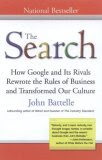SAN FRANCISCO - Anna Patterson's last Internet search engine was so impressive that industry leader Google Inc. bought the technology in 2004 to upgrade its own system.I played around with Cuil only to find its index a bit stale, its relevancy algo's a bit 'eh', and its infrastructure unable to handle the "load" I placed by querying a couple keyphrases.
She believes her latest invention is even more valuable — only this time it's not for sale.
-Yahoo! News
But it looks pretty damn hot. At least it's got that.
The reality is that Google will prove very difficult to topple for some key reasons. Here are three:
1. ASSETS
While Patterson and her Cuil have some $33 million in venture capital behind them and the squirrelly Page and Brin were given a check for a meager $100,000 (twice what they had very boldly asked for, by the way) in the summer of 1997 shortly before they incorporated, Search has changed. That was then. And this is, a quite very different, Now. It wasn't just Google's initial technology that was ground-breaking, it was Page's and Brin's ambition, and their innovative, futuristic vision. They were later given $25 million by Sequoia Capital (*ahem* Yahoo!) and Kleiner Perkins Caulfield & Byers (remember AOL? Excite? Oh yeah, and KPCB partner John Doerr had also previously funded another little internet thingy - you may have heard of it... "Amazon"?). But even all that was then, and the reality of the Now is that Google reported revenues in excess of $5 billion for the quarter that ended June 30, 2008 (representing a 39% increase over the second quarter of 2007). With such deep pockets I think it's accurate to say that whatever Google wants, Google gets. Google's dovetailing of this type of clout with the ambition and innovation that led to it in the first place makes Cuil's grandiose visions of usurpation quite daunting.
2. INFRASTRUCTURE
Google's supersecret, flexible, scalable network of datacenters is the subject of endless and often Area 51-like speculation. Though Google has been historically very cryptic about its datacenters, hired CEO Eric Schmidt leaked the following curious fact: Google uses 10 MEGAwatts of electrical power. An infrastructure of this magnitude might be thought of as a behemoth, an electronic bureaucracy - a one million watt gorilla - with all the torpidity of a sluggardly hulk. I mean, they own the whole company that owns all the satellites informing Google Earth (speaking of Area 51...). And Google's infamous, egocentric pride may cause some to suspect that a new hot-shot search engine like Cuil might be able to take advantage of the Big G's potential, psychologically stymieing, Hare-like hubris. But think about it this way: does having more power make the Enzo Ferrari slower? Only if you consider cranking out 660 horsepower at 7,800 RPM, and going from zero to 100 mph (161 kph) in any faster than 6.6 seconds to be "slow". Google's algorithm updates ("Dances") occur so frequently now that Google's commemorative dances don't even roughly correspond to them (speaking of which, wanna sneak into this year's with me?). My point? Google may be powerful, but don't underestimate their agility out of hand. And since the knees of Cuil's servers are buckling on day one, who knows if it can scale rapidly enough to accommodate the growth afforded by all the hype generated by its claim that it "has indexed 120 billion Web pages, 3x more than any other search engine" (not that Google has publicly confirmed the size of its index anytime recently...)? And if Cuil doesn't scale rapidly enough to accommodate the immediate influx of trial users, how can it think it will be able to generate more traffic in the future, and accommodate it then?
3. DATA

Ever heard of Google Trends? Well take a moment to investigate Google's Zeitgeist archives and then reflect on all the data Google doesn't share. Now if you think that services like Trends and Zeitgeist are gracious and forthcoming, consider the various entanglements Google's been in because it refused to disseminate data (here's that one from 2006, if you're interested). From a certain perspective Big Brother G arguably knows more about us as a society than we know about ourselves. John Battelle, author of one of my favorite books called "The Search" (and cofounding editor of Wired and founder of The Industry Standard), discusses Google's "database of intentions" at length in his fascinating book (liked "Freakonomics"? Try "The Search"). He refers to Google as having hijacked into the central nervous system of wired culture.
Google has a head start on Cuil in terms of age sure, but it also already has 78.35% of the Search marketshare! I can't imagine how Cuil could even get close to procuring data rivaling Google's. And in the information age, information = power.
In the end, I think another Search player could be very healthy in a market where the overwhelmingly dominant engine (whose well-known unofficial motto is "don't be evil") exhibits questionable privacy practices and cooperates with an oppressive communist power. But will Cuil ever generate enough momentum (and eschew getting bought out by Yahoo! or Microsoft in the process) to be any kind of force in the Search industry?

